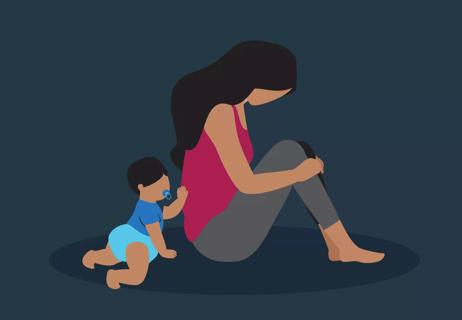It's the first medicine approved for this use

The first weeks of motherhood should be generally full of joy – albeit tired, sometimes frustrated joy. But for more and more women, they are instead marked by debilitating feelings of sadness, anger or guilt.
Advertisement
Cleveland Clinic is a non-profit academic medical center. Advertising on our site helps support our mission. We do not endorse non-Cleveland Clinic products or services. Policy
The U.S. Food and Drug Administration recently approved a first-of-its-kind treatment for adult women with postpartum depression that is expected to work faster than other antidepressants already on the market, which can take weeks to take effect.
“This is particularly timely as we Ob/Gyns implement new recommendations from the American College of Obstetrics and Gynecologists for earlier and more frequent postpartum depression care,” says Ob/Gyn Jonathan Emery, MD.
Here he answers some questions about the new postpartum depression drug.
A: About 10 to 15% of women will experience significant postpartum depression, which can have adverse effects on the mother and infant. Symptoms can include lethargy, hopelessness, feeling disconnected from the infant, fluctuations in weight, difficulty sleeping and suicidal ideation.
Postpartum depression can hit some women harder than others due to lack of sleep, an ill infant who may need extended hospitalization, lack of family support, hormonal changes and a woman’s own expectations of motherhood.
Clinical risk factors for postpartum depression include:
Advertisement
A: Brexanolone (ZulressoTM) injection is the first drug specifically approved for treatment of postpartum depression. It works quickly – within a few days, according to three clinical trials sponsored by Sage Therapeutics, the company that makes the drug.
Specifically, clinical trials found that brexanolone injection led to significant reductions in the Hamilton Rating Scale for Depression score (a tool that doctors use to measure depression symptoms) after a 60-hour infusion, compared to the placebo.
A: The way it works is different from other antidepressants. Chemically, brexanolone is identical to endogenous allopregnanolone, a hormone that decreases in a woman’s body after childbirth and is thought to be associated with postpartum depression.
Brexanolone must be administered by a healthcare professional in a healthcare setting via continuous IV for 60 hours.
In clinical trials, the most common side effects included headache, dizziness and sleepiness.
A: While it is exciting to have a new medication to offer our patients, questions remain about length of stay in the hospital while receiving the infusion and how long the positive effects of the brexanolone injection will last, as the clinical trials did not follow up on participants after the 30-day trial period.
It is also up to us to figure out which patients are best served by the medication, and which patients may need to supplement it with traditional antidepressants or cognitive behavioral therapy. While this new medication gives us another promising treatment option, we need to be sure to approach these treatments holistically.
We should all be screening for postpartum depression. With newer treatment such as brexanolone injection coming on to the market, it will be imperative that we screen and treat these women during this vulnerable time.
Advertisement
Learn more about our editorial process.
Advertisement

What to know, and when to seek help

Heavy bleeding, pain and persistent sadness could be something more serious

Sad feelings and teariness that persist are a sign

Bleeding is a risk and warrants taking care, but the reward of this lifesaving medication is great

Severe and debilitating headaches can affect the quality of your child’s life

Type 2 diabetes isn’t inevitable with these dietary changes

Applying a hot or cold compress can help with pain